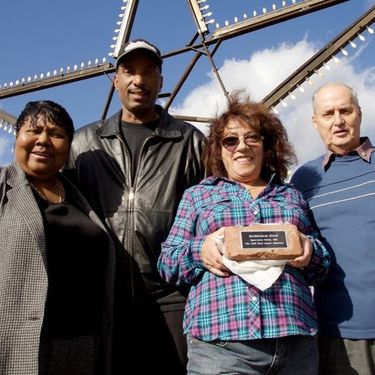
Eman Shokry Hesham
Sessions in which Eman Shokry Hesham participates
Monday 6 June, 2016
Sessions in which Eman Shokry Hesham attends
Friday 3 June, 2016
Find out more about all the eras that shaped Montréal with this interesting walking tour, from the foundation of Fort Ville-Marie in 1642 to today’s modern city. The historic heart of the city and its adjacent Old Port will help illuminate the story of one of the greatest cities in the Americas. Your guide will lead you through a maze of narrow streets where you can find a multitude of historic buildings. Explore the birthplace of our metropolis and experience a special voyage back in time! ...
Welcome addresses and cocktail, followed by the Concordia Signature Event "The Garden of the Grey Nuns". As the opening ceremony and cocktail take place in the former Grey Nuns' Motherhouse, recycled into campus residence and reading rooms by Concordia University, delegates will also have the possibility to discover the video Three Grey Nuns (3 minutes, by Ron Rudin and Phil Lichti. Three Grey Nuns recount their memories of communal life in the Grey Nun’s Motherhouse. Built...
Working with archival documents and the current-day morphology of the Grey Nuns' site, Dr Cynthia Hammond, Dr Shauna Janssen, in collaboration with Dr Jill Didur, will curate a series of installations and performances that speak directly to the rich heritage of a specific urban landscape: the gardens of the Grey Nuns' Motherhouse, now part of the Concordia University downtown campus. Visitors will have the opportunity to explore the lost working gardens of the Grey Nuns. As with other such...
Saturday 4 June, 2016
What if we changed our views on heritage? And if heritage has already changed? While, on the global scene, states maintain their leading role in the mobilization of social and territorial histories, on the local scale, regions, neighbourhoods and parishes have changed. Citizens and communities too: they latch on to heritage to express an unprecedented range of belongings that no law seems to be able to take measures to contain, often to the discontent of...
This festive event will offer delegates a taste of one of the iconic dishes of Montreal, the smoked meat sandwich, imported by Jewish immigration from Eastern Europe in the early 20th century. In particular, the tasting will allow a discovery of the products of the renowned international institution Schwartz's, the Hebrew Delicatessen for which Montrealers and tourists alike are willing to wait in long line-ups. During the tasting, “Chez Schwartz,” a documentary produced by Garry B...
Most of what we experience as heritage emerges into conscious recognition through a complex mixture of political and ideological filters, including nationalism. In these processes, through a variety of devices (museums, scholarly research, consumer reproduction, etc.), dualistic classifications articulate a powerful hierarchy of value and significance. In particular, the tangible-intangible pair, given legitimacy by such international bodies as UNESCO, reproduces a selective ordering of cul...
Sunday 5 June, 2016
Movement, stillness, and creation will be combined during this walk as participants are encouraged to attune themselves to the environment through conscious emplacement. We will awaken our sensory awareness by experimenting with deep listening, observing impermanence and slow walking. Weather permitting, participants will also be invited to create a cyanotype photogram with found materials. An in-situ photogram is an image made in collaboration with the environment and enhances our a...
"What does heritage change?" is a multifaceted question to which the answer(s) are in primary respects related to real-life negotiations among different groups of citizens, cultures, races, ethnic groups, sexual identities, and social classes about received, official and/or widely accepted or accomodated intangible attributes, cultural traditions, historic monuments, buildings, and other transmitted or revived historical legacies. Heritage designated by and for whom, for what motivations, an...
Monday 6 June, 2016
Canal: Walking the Post-Industrial Lachine Canal (COHDS, 2013 - bilingual) is an audio-walk and booklet that takes listeners from the Atwater Market to the Saint Gabriel Lock, exploring the post-industrial transformation of a once heavily industrialized area. The Lachine Canal area has undergone dramatic changes, as mills and factories were closed and then demolished or converted into high-end condominiums. The adjoining working-class neighbourhoods ...
In addressing the theme of this conference, we argue that archaeology, above and beyond the traditional goals of research and post-excavation analyses, may contribute to economic development, education and the creation of identities and communities. Our session "What does Heritage Change? Case Studies in Archaeology," is divided into two themes starting with archaeological practice through its legislation and management. Contract or commercial archaeology increasingly comprises the vast major...
As Canada shifts from a resource-based economy to a knowledge-based economy, small communities that were established to service the primary sector are faced with a complex and unique set of challenges. They are communities built on a culture of hard work, resourcefulness, and creativity; their residents are now tasked with developing strategies to deal with a lack of employment, depopulation and resettlement. Small is premised on the notion that leveraging the rich cultur...
Le patrimoine fait aujourd’hui l’objet d’attentions autant que d’agressions et de destructions. Cela peut s’expliquer par les difficultés de son identification ou de sa conservation. Cela peut plus profondément s’expliquer parce que, dès le départ, il célébre un événement ou conserve une mémoire qui peut être ou devenir une source de dissenssions et de conflits politiques. Enfin, sa reconnaissance suscite des gains économiques pour les uns mais des pertes pour les autres. Mais peut-être...
To celebrate our film series dedicated to heritage, sponsored by the Department of American Studies at the University of Maryland and the United States Chapter of the Association of Critical Heritage Studies, this event will spotlight the iconic Sugar Shack, which is rooted from Quebec to New-England and which is both the place of maple syrup production and of friendly gatherings during the maple syrup season. In a festive atmosphere, delegates will be invited to taste one of the essential of...
Directed by William Shewbridge and Michelle Stefano USA; 35 mins Presented by Michelle Stefano ___ After 125 years of operation, the Sparrows Point Steel Mill (Baltimore, Maryland) finally closed its doors in 2012. The film, “Mill Stories”, examines the importance of the mill from the perspectives of former workers and community members while connecting their story to the larger narrative of industrial boom and bust. The film seeks to amplify the voices of forme...
Directed by Christine Walley and Chris Boebel Presented by Michelle Stefano When the steel mills began closing on Chicago's Southeast Side, residents could feel the American Dream slipping away. Decades later, the loss of the steel industry has left permanent scars. The documentary film, Exit Zero: An Industrial Family Story, is named for the highway exit number for Chicago’s old steel mill neighbourhoods and captures the feeling of a region passed over. In poignant and some...
Tuesday 7 June, 2016
(Guided visits to Two Exhibitions, Centre d’histoire de Montréal- bilingual) – The Centre d’histoire de Montréal presents Dans le Griff that takes visitors into the neighbourhood of Griffintown, as depicted through the lives and memories of the Mercier family. Their life stories will take us down the streets of an industrial sector that has undergone quite the metamorphosis. Griffintown is one of the oldest industrial and working-class neighbourhoods in Montreal. In the forefro...
An experiment in moving memory, this live event bridges public and academic space to re-imagine knowledge exchange, creation and impact. Around the globe the planning of large-scale memorial-museum projects concerned with violent histories are frequently marred by conflict, omission, and competitions of victimhood. This problem also extends to scholarship on genocide and memory. “Moving Memory: difficult histories in dialogue” is a collaborative multi-sited research exhibiti...
The roundtable will explore ideas around the concept of insignificance. That is, how things are judged to be unimportant, not worthy of conservation, meaningless, or without substantive power or influence. We will examine this notion in relation to the history, theory, and practical application of significance as a concept and method in heritage. In short, we will discuss the significance of insignificance. The notion of ‘significance’ is central to heritage conservation in many pa...
The closing dinner of the conference, called “Pawâ” according to a French-Canadian tradition borrowed from the Native American lexicon, will be an opportunity to discover, in the heart of the Old Port of Montreal, an original culinary creation by the caterer Agnus Dei, from the renowned Maison Cartier-Besson in Montreal, leader in its field for its boundless creativity and event expertise. The dinner, in the form of stations, will offer delegates an exploration of Quebecois culinary heritage,...
Wednesday 8 June, 2016
||| Les Mohawks constituent la nation amérindienne la plus nombreuse parmi les dix différentes nations que compte le Québec. La nation mohawk compte près de 17 350 habitants. Il y en a 2 700 qui vivent hors réserve et les autres sont dispersés dans trois grandes communautés que sont : Kanesatake, Akwasasne et Kahnawà :ke. Située à proximité de Montréal, sur la rive sud du fleuve Saint-Laurent, la communauté de Kahnawà :ke compte près de 7 300 habitants. Elle est parmi les première...












